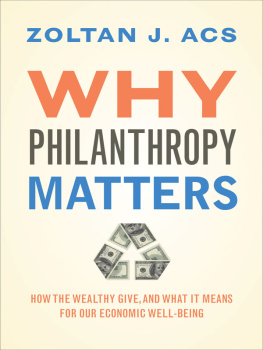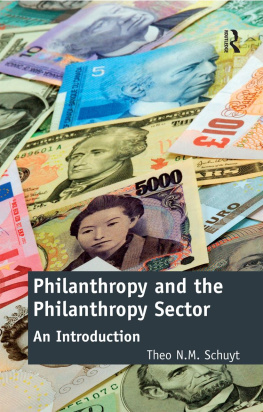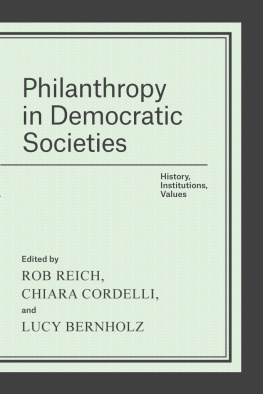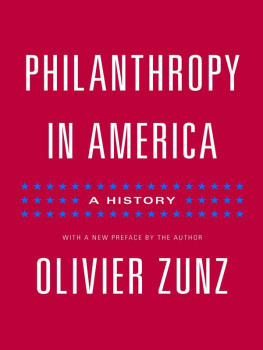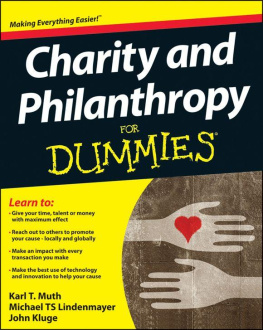
WHY PHILANTHROPY MATTERS

Copyright 2013 by Princeton University Press
Published by Princeton University Press, 41 William Street, Princeton, New Jersey 08540
In the United Kingdom: Princeton University Press, 6 Oxford Street, Woodstock, Oxfordshire OX20 1TW
press.princeton.edu
All Rights Reserved
cs, Zoltn J.
Why philanthropy matters : how the wealthy give, and what it means for our economic well-being / Zoltan J. Acs.
p. cm.
Includes bibliographical references and index.
ISBN 978-0-691-14862-5 (hbk. : alk. paper) 1. Endowments. 2. Rich peopleCharitable contributions. 3. HumanitarianismEconomic aspects. 4. EntrepreneurshipSocial aspects. 5. CapitalismSocial aspects. I. Title.
HV25.A27 2013
361.7'4dc23 2012031852
British Library Cataloging-in-Publication Data is available
This book has been composed in Sabon
Printed on acid-free paper.
Printed in the United States of America
10 9 8 7 6 5 4 3 2 1
Dedicated to Ashley and Annabel
CONTENTS
PREFACE
It is often said that discoveries large and small are historical accidents. The discovery of America is one of those accidents. Christopher Columbus was looking for a sea route to India and discovered the Americas. The story of this book is no exception. In 1976, I was a graduate student trying to understand the American economy from the perspective of large corporations and large unions for my dissertation. In particular, I was looking at the U.S. steel industry, but it could have been any one of several large managed industries in America at the time. While trying to understand inflation, I discovered a peculiar anomaly about American-style capitalism.
While large steel firms like United States Steel were having a difficult time competing in the global marketplace, entrepreneurs were starting new steel companies all over America and competing with the big boys and the Japanese. Of course this would not have been an interesting story but for the fact that large firms were supposed to be technologically and organizationally superior to any small firm in the economy. Thus I began an interesting journey to explain how the United States was evolving from a managerial economy to an entrepreneurial society.
Over the decades following this accidental discovery I became a student of entrepreneurship and innovation: big business and small business, low technology and high technology, America and the rest of the world. My partner in much of this was David B. Audretsch, whom I met in 1979. With a suitcase full of data we traveled to Berlin together, trying to decipher the secrets of large and small firms, of innovation, and of technological change. I am deeply indebted to him for the years of collaboration and thoughtful scholarship.
In Berlin at the WZB (an island behind the Iron Curtain), David and I unraveled some of the secrets of how entrepreneurs were transforming the U.S. economy and how government was systematically dismantling the managerial economy. Over the decades, we established an understanding of how the small-firm sector operated and why it was important for the economy.
In 1989, I moved back to the United States and took a position at the University of Baltimore. These were exciting times. The entrepreneurial revolution was under way and the United States was in the drivers seat. The Berlin Wall had just fallen, communism was relegated to the dustbin of history, and the future looked bright. Entrepreneurs were starting to transform the world. The information revolution was in full swing.
It was at this time that I met Richard Florida and we started to collaborate on the importance of innovation and cities. This was a hot topic, as Bostons Route 128 and Silicon Valley were the sources of the information revolution and understanding how these two regions spawned this revolution was on everyones mind. As countries shed central planning and state ownership, the world was looking for a market solution to its problems. Richard and I, along with Maryann Feldman, Attila Varga, and Sam Yung Lee, started to better understand the importance of cities and entrepreneurship in economic development. Richard has continued to be a valuable colleague over the years.
During the mid-1990s I spent five years in Washington, DC. My first appointment was at the U.S. Small Business Administration. I was no stranger to the agency, having used its data in much of my previous research. While at the SBA I recognized the need to develop policies to support an entrepreneurial economy. The policy agenda of the managerial economy was well worked out, but the details of how an entrepreneurial economy functions and can be supported were less well known. In Washington, I met Catherine Armington, with whom I worked for several years at the U.S. Bureau of the Census. I am grateful for her support.
The second part of the historical accident happened when my longtime friend Andrew Capitman, an investment banker, suggested to me that American-style capitalism was as much about philanthropy as about entrepreneurship. He said, Look at all these beautiful buildings at Yale University; they were all donated by some rich guy. The challenge was to figure out how these two pieces of the puzzle fit together. How did philanthropy fit into American-style capitalism? It sounded like Taoist philosophy: light and dark, yin and yang. Everything has both yin and yang aspects as light cannot exist without darkness, and vice versa, but either of these aspects may manifest more strongly in particular objects, and may ebb or flow over time.
I was intrigued, so I did what any good scholar would do: I looked for books on entrepreneurship and philanthropy. Because this was an interesting subject, I was sure that it had been well researched by scholars. Having a good handle on the entrepreneurship literature, I started to read about philanthropy. I discovered a large literature on everything from wealthy individuals to great foundations, but I could not find anything written that tied these two topics together. The more I looked the more intrigued I became, not with what I had discovered but with what I could not find.
I met up with an old friend and colleague at the American Economic Association meetings, where I had just presented a paper on the subject to an unsympathetic audience. Ronnie Phillips, a professor at Northern Colorado University, was a student of American institutionalism, so I explained to him what puzzled me. He was interested and we started a research project on entrepreneurship and philanthropy. After three long years, we had a rudimentary understanding of what we were searching for. The story was sketchy at best and incomplete but it started to make sense. America was different, and it had forgotten that it was.
Following this, Pontus Braunerhjelm at the Royal Academy in Sweden and I started to work on the subject. We carried out several projects on entrepreneurship and philanthropy comparing Sweden and Ohio. Putting this into the context of economic growth, we started to explain why the United States outperformed Europe. At the same time, Leo Paul Dana at McGill University and I worked on philanthropy in China.
In 2004, David Audretsch and I went back to Germany and set up a research unit on entrepreneurship, growth, and public policy at the Max Planck Institute of Economics in Jena. The world was trying to figure out how an entrepreneurial economy functioned in America, in Europe, and in the rest of the world. I was convinced that philanthropy had to be part of the story. The institute became the leading research center trying to understand entrepreneurship in the twenty-first century and provided fertile ground for sorting out some of these ideas.
Next page
